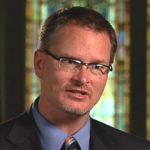Hamilton, Adam. Christianity’s Family Tree: What Other Christians Believe and Why. Abingdon Press, 2007. ISBN: 9780687481162.
Meet the Author
 Adam Hamilton is the founding pastor of the United Methodist Church of the Resurrection, which has grown from four members in 1990 to over 12,000 members today. Hamilton’s parish is currently the largest in his denomination with an average weekly worship attendance of over 7400. He was named by Religion and Ethics Newsweekly as one of the top ten “People to Watch” and is the author of nine books including Catch: Attracting and Keeping Visitors; Seeing Gray in a World of Black and White: Thoughts on Religion, Morality and Politics; and Christianity’s Family Tree: What Other Christians Believe and Why. For more information, visit his blog.
Adam Hamilton is the founding pastor of the United Methodist Church of the Resurrection, which has grown from four members in 1990 to over 12,000 members today. Hamilton’s parish is currently the largest in his denomination with an average weekly worship attendance of over 7400. He was named by Religion and Ethics Newsweekly as one of the top ten “People to Watch” and is the author of nine books including Catch: Attracting and Keeping Visitors; Seeing Gray in a World of Black and White: Thoughts on Religion, Morality and Politics; and Christianity’s Family Tree: What Other Christians Believe and Why. For more information, visit his blog.
Book Basics
Christianity’s Family Tree: What Other Christians Believe and Why is an introductory text written to “help you learn from your brothers and sisters of other denominations so that your faith might be enriched and we might be more authentic and effective disciples of Jesus Christ” (p. 12). Hamilton’s interest in the body of Christ beyond his denomination is rooted in both his understanding of the ecumenical nature of that denomination and in his own life experience. His faith journey has been influenced to varying degrees by the Baptist, Episcopal, Greek Orthodox, Methodist, Pentecostal, and Roman Catholic traditions. The book explores eight traditions in the order they developed with the exception of the chapter on Methodism, which is placed last and receives expanded consideration. After exploring the traditions, he concludes with the idea that the many traditions within the body of Christ form a beautiful tree with many branches (denominations), a single trunk (Jesus), and shared roots (Judaism).
“help you learn from your brothers and sisters of other denominations so that your faith might be enriched and we might be more authentic and effective disciples of Jesus Christ” (p. 12). Hamilton’s interest in the body of Christ beyond his denomination is rooted in both his understanding of the ecumenical nature of that denomination and in his own life experience. His faith journey has been influenced to varying degrees by the Baptist, Episcopal, Greek Orthodox, Methodist, Pentecostal, and Roman Catholic traditions. The book explores eight traditions in the order they developed with the exception of the chapter on Methodism, which is placed last and receives expanded consideration. After exploring the traditions, he concludes with the idea that the many traditions within the body of Christ form a beautiful tree with many branches (denominations), a single trunk (Jesus), and shared roots (Judaism).
So What?
Hamilton’s study is based not only on his research with leaders in the various traditions, but also an eight week sermon series in which he introduced his congregation more fully to the worship and beliefs of these groups. As he explores each denomination, he focuses on the strengths or contributions to the church universal including:
- Orthodoxy – an emphasis on what is ultimately real (the kingdom/reign of God which is both to come and yet something we are called to participate in today)
- Catholicism – power of ritual
- Lutheranism – priesthood of all believers
- Presbyterianism – sovereignty of God
- Anglicanism – importance of prayer
- Baptists – centrality of missions and evangelism
- Pentecostals – the power of the Holy Spirit
- Methodism – emphasis on personal faith
Questions for reflection:
- What is one of the strengths your denomination contributes to the beauty of the Christian family tree?
- How has your own faith journey been enriched by other traditions?
- How is Hamilton’s view of the body of Christ needing its many branches helpful (or not helpful) in your understanding of Christian unity?